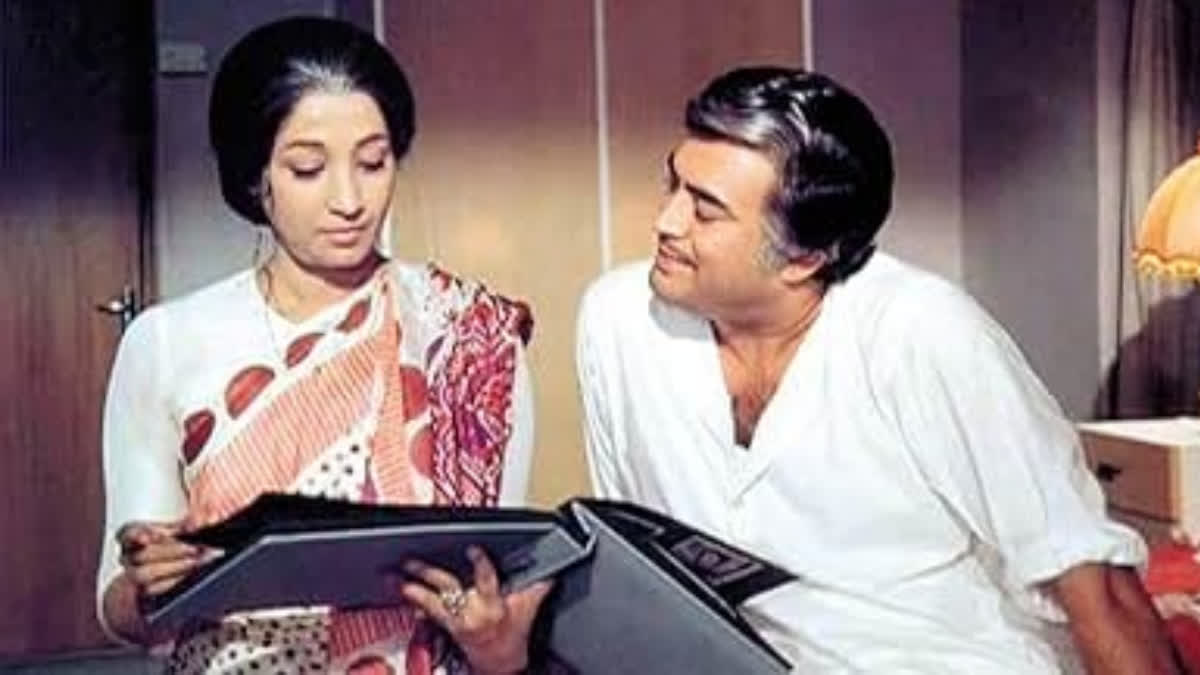Gulzar's timeless classic 1975 release Aandhi, a mature love story in the backdrop of politics arrived amidst controversy. After the release (50 years ago on February 13), it was felt that the film starring Suchitra Sen and Sanjeev Kumar was based on the life of the then Prime Minister Indira Gandhi. Some of the film's posters also hyped the similarity, a poster in South India declared, ‘See your Prime Minister on screen’.
An advertisement in a Delhi daily called the film 'the story of a great woman political leader in Post-Independence India'. It’s said that I K Gujral, the then Information and Broadcasting minister, had sent his staff members to watch it before deciding whether it was fit for continued public screening or not. Nothing about the film was found objectionable and director-screenwriter Gulzar himself insisted that there was no similarity between the lead character Aarti Devi and Indira Gandhi. Yet the rumour mills continued to buzz.
However, the similarities were uncanny, especially the leading lady's appearance, the way she dressed, the way she wore her white sari, the streak of silver hair, and her quiet and firm brisk walking style ...The decision to ban came after it had a good run of over 20 weeks.
Gulzar wanted to make a film about a modern Indian politician, and so he modelled the character on Indira Gandhi as he much later said in 'Gulzar's Aandhi: Insights Into the Film' penned by Saba Mahmood Bashir: "At the time it was not Indira Gandhi's life story. But even today, there is no one like her, so she was the best persona to keep in mind. Accordingly, that was the reference one could offer to any actor – the way she used to walk, the way she used to descend a flight of stairs, the way she would come out of a helicopter. We used her traits in good taste – not because the character was based on her or her life."
Aandhi's plot revolves around an estranged couple (Suchitra Sen and Sanjeev Kumar) who meet by chance after several years, when the wife, now a politician, comes to stay in a hotel run by her husband.
"What was found intriguing is that the film was banned despite having a valid censorship certificate and having already run for over 20 weeks in cinema houses. Not only that the film had to be withdrawn from the Moscow International Film Festival because of this ban by the Government of India under Prime Minister Mrs Indira Gandhi who had imposed an internal national emergency on 25 June 1975 which lasted for 21 months. Gulzar who had then taken the film to Moscow International Film Festival got the news of the ban prior to the screening. He was also informed that the film publicity posters be taken down and the prints sent back. The minister for Information and Broadcasting [I&B] under which the film censor board worked was V. C. Shukla. Though when the film was shot the I&B minister was Mr I K Gujral who found nothing objectionable in whatever he saw," recalls noted film historian, Amrit Gangar.
Apparently, the major reason for the ban came when the opposition leaders in Gujarat began showing scenes of ‘Aarti Devi’ smoking and drinking during their Assembly election campaign. As the film gained momentum, some ambitious exhibitors even started promoting the film with the line: ‘See Indira Gandhi in Aandhi’. By now the film was openly courting controversy, despite being only a mild satire on politicians. The film was eventually banned 26 weeks after its release. In order to emphasise that the film had no biographical elements, Gulzar, post-emergency had to insert a scene with ‘Aarti Devi’ looking at the framed image of Indira Gandhi and telling her father that she wants to serve India like Mrs. Gandhi, ‘Woh meri ideal thi’ (She is my ideal). ‘They made us add that bit. They insisted. By then the movie was running in its 23rd or 24th’, Gulzar had said. By then everybody had already seen the film.
While the film is often quoted when a mainstream Hindi film runs into political controversy, many insist that there was no politics behind the film’s ban. “There was no politics behind the decision,” says Manoj Srivastava, a film historian, ex-CEO of International Film Festival of India (IFFI) Goa, and filmmaker. “After the release and over 20 weeks run some felt that with elections approaching and the film showing the female protagonist (with a close resemblance to Indira Gandhi) smoking and drinking could tarnish the image of the prime minister as well as the Congress party. Since there was an appeal from the government, the screening was halted in order to avoid any kind of bias because the producer-director had said it was not about the prime minister and there was just a resemblance with the politician called Tarkeshwari Sinha,” says Srivastava.
"… the opposition parties remarked that Aarti Devi’s character is shown to consume alcohol, and some decided to connect the two unrelated personalities. Further, seeing the advertisements and posters for the film, more trouble ensued. But for me, she was only a reference for personality traits and mannerisms. I think Kamleshwarji (writer) only took the name of Tarkeshwari Sinha to escape from a situation," Gulzar had said.
The film was released again in theatres in 1977 after the emergency was lifted and the new government Janata Party was elected. The film had a decent run obviously because of the controversy surrounding it besides interesting and different layers in its plot, brilliant performances, and, of course, with R D Burman's music and good collection of songs like ‘Tere bina zindagi se shikwa’, ‘Iss modh se jaate hain’ and 'Tum aa gaye ho' hitting the popularity charts.
“At that time, the Central Board of Film Censorship had not yet become the Central Board of Film Certification (CBFC). It was the political climate of national emergency that had vitiated the atmosphere. No member of any official body (e.g. film censor board) would make any comment, even in private, but I believe some publicity posters had made some sensationalizing claims. The Aandhi producer J. Om Prakash along with the director had maintained that the film had nothing to do with Indira Gandhi’s life or her character and the film’s story was about the marital relationship and individual ambitions. A woman politician in the film is an ambitious character. She knows the election jugglery of Parliamentary democracy,” Gangar further adds.
Some critics drew thematic parallels between Indira Gandhi and her father Jawaharlal Nehru as depicted in the film and references to their personal lives. There were also talks about the role of Sanjeev Kumar having shades of Mrs Gandhi's husband. Through the controversy, Gulzar denied any connection with Indira Gandhi, it was only after she lost the national elections in 1977 and Janata Party came into power, did he admit, 'Yes, the film was made with Indira Gandhi in mind' while Sanjeev Kumar on his part said, 'only the characterisation of his role was based on Feroze Gandhi'.
Interestingly, 1975 turned out to be the most prolific year for Gulzar. An early version of Aandhi’s story was written by veteran screenwriter Sachin Bhowmick, however, it did not go well with Gulzar who had an idea of an estranged couple meeting in a hotel after years which he started developing. Prominent writer Kamleshwar joined as the writing crew, as the film’s shoot began. Kamleshwar later went on to write a full-fledged novel, Kali Aandhi (Black Storm), which is quite different from the film. Subsequently, the film was written simultaneously along with another Gulzar film, Mausam (1975, also starring Sanjeev Kumar). Along with Jeetendra-Hema Malini starrer Khushboo, Aandhi was also released in the same year, 1975 proving to be the most prolific for Gulzar's career.
Read More
- Rakesh Roshan on Netflix' Docu-series the Roshans: 'I've Made 17 Films but Never Got so Many Messages...'
- INTERVIEW | Yami Gautam and Pratik Gandhi on Romcom Dhoom Dhaam, Challenges Doing Mindless Comedy and Breaking Stereotypes
- Debutant Veer Pahariya Ahead of Sky Force Release: 'Always Felt That I Come From a Political Family and Living Very Sheltered Life'



